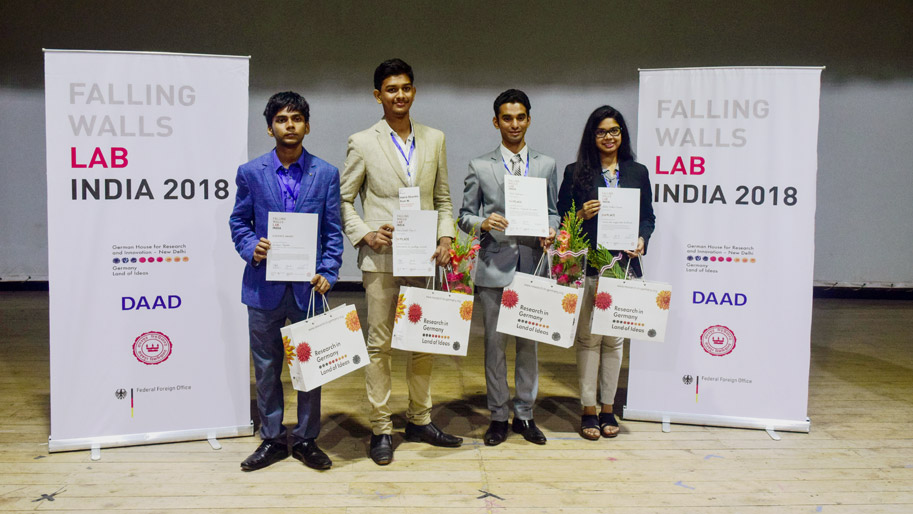Falling Walls Lab India 2018
 © DWIH New Delhi
© DWIH New Delhi
Commemorating 20 years of the great fall of the Berlin Wall on 9th November 1989, the Falling Walls was set up in the year 2009 and has since then served as a unique platform to take humanity forward and break the walls or in other words the challenges faced by people in today’s day and time. An offshoot of the Falling Walls Foundation, the Falling Walls Lab serves as a forum for young researchers, scientists, entrepreneurs and professionals to present their breakthrough ideas in just three minutes to a distinguished jury from science and business and answers the interesting question of “which walls will fall next?”
Falling Walls Lab (FWL) India 2018 marked its third consecutive year and received overwhelming response with more than 260 applications from all over the country. Organised by the German House for Research and Innovation – DWIH New Delhi and the German Academic Exchange Service – DAAD, this event was co-hosted by Jadavpur University, Kolkata on 7th April 2018 and gave a stage to 16 shortlisted participants to showcase their ideas.
Exhibiting great appreciation for the format, the event began with a welcome address by Prof Dr Ashish Swarup Verma, Pro Vice Chancellor- Jadavpur University. Welcoming the participants and the audience, Prof Verma said that “the Falling Walls Lab is a unique competition that aims to find out people who have sustainable and cheap solutions to various problems faced by the world.” Further, acknowledging the relevance of this event, Dr Matthias Kiesselbach, DWIH Chairperson rightly added that “good ideas demand a lot of investment in terms of time, energy, money etc. and an idea has to be really good to have the potential of bringing a wall down all by itself.” In addition to this, in an intriguing inaugural address, Dr Michael Feiner – Consul General of the Federal Republic of Germany in Kolkata claimed that the exclusivity of Falling Walls Lab also lies in the way in which boundaries are broken between different fields and this is what makes this event so interdisciplinary.
Hence, true to its nature of being interdisciplinary, the competition at Jadavpur University began with a confident presentation by Mr Aashish Raj who broke the walls of potable water deprivation near cremation sites by devising Moksha – a tool for capturing ashes of the dead. Additionally, there were other interesting presentations such as that of Mr Muthu Mariappan H. which focussed on overcoming the challenge of hearing impairment through a device named Cas Talk that can convert hand gestures to speech and vice-versa. However, amongst all the great ideas, Mr Soumya Mondal – an aspiring video game developer took away the audience choice award for his interesting innovation of a device and a game app that lets people keep a check on their and their neighbour’s energy consumption in a fun way.
Moreover, while Mr Amit Lokhande bagged the third prize for his contribution to phosphorus diagnosis in cattle, the second prize was given away to the very deserved Anisha Krishna Kumar for innovating Sakhi – a smart bra that can check the development of breast cancer in women and warn them in time to get the right medication. Last but not the least, Veera Shanthi Ram M. – a student of the National Engineering College, Kovilpatti, was adjudged as the winner of the FWL India 2018 for breaking the walls of inconvenience in grading coconuts thus saving 65-70% of the losses made by industries in the whole process of checking the quality of the same. With a process of determining the quality of the fruit by analysing frequencies during a striking mechanism, Veera Shanthi not only won the ticket to the FWL finale to be held on the 8th November in Berlin but also to the prestigious Falling Walls Conference to be held on 9th November where leaders from science, industry and policy-making meet.
Date: Saturday, April 07, 2018
Venue: Jadavpur University, Kolkata
